Monday, July 6, 2009, 10:10 - Commentary, Photo of the Day
How we treat those who transgress our laws is in interesting indication of what the values of a society are. Europeans as we are well aware have different values so why should it be a surprise that some of their prisons are also different? We get a look inside via the New York Times Magazine.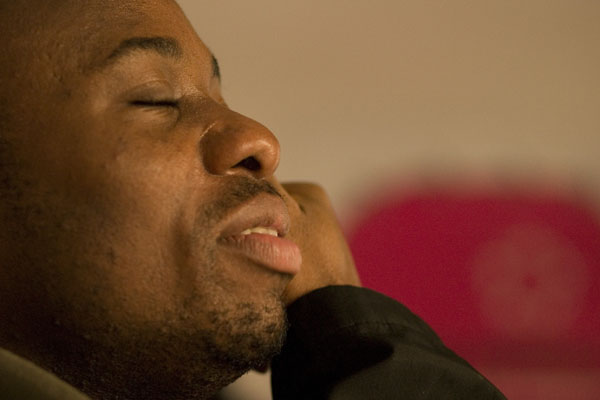
Not for me. Vienna 2008. © Damaso Reyes
“On one side of the prison there was a block of prisoners on remand; on the other side were the convicts, living in units called pods — groups of 15 one-person cells with floor-to-ceiling windows, private lavatories and a common space that includes a small kitchen. We came upon one prisoner cooking a late lunch for a few of his podmates; we stood there for a bit, chatting. They were wearing their own clothes. The utensils on the table were metal. “They are criminals,” Hohensinn said to me, “but they are also human beings. The more normal a life you give them here, the less necessary it is to resocialize them when they leave.” His principle, he said, was simple: “Maximum security outside; maximum freedom inside.” (The bars over the balconies are there to ensure the inmates’ safety, Hohensinn said; the surrounding wall outside is more than enough to make sure no one gets free.)
“We walked around some more. There was a gymnasium, a prayer room, a room for conjugal visits. I asked Hohensinn what he would do if, contrary to fact, it were conclusively proved that prisons like his encouraged crime rather than diminished it. Would he renounce the design? He shook his head. “The prisoners’ dignity is all I really care about,” he told me.”
It is well worth reading the whole article. Of course this prison is atypical, a visit to a detention center where Austrians hold asylum seekers is a very different story indeed. But it is still a fascinating experiment in crime and punishment.
America with its draconian drug laws which have helped the nation to achieve the dubious distinction of incarcerating more of its population than any other western country could learn quite a bit from the approach these jailers are taken. Clearly if we want prisoners to re-enter society we should focus on rehabilitation instead of punishment. It will be interested to see who takes note of this Austrian experiment.
| 0 trackbacks
| 



 ( 3 / 2181 )
( 3 / 2181 )




 ( 3 / 2181 )
( 3 / 2181 )
Friday, July 3, 2009, 14:31 - Commentary, Photo of the Day
France is known for its rich cultural legacy one that is perhaps best or at least most famously manifested in its food. To visit France is to eat well, trust me, I know! But who are these people who fill the American fast food restaurants in Paris? Certainly not Americans by and large. We learn more from Slate.com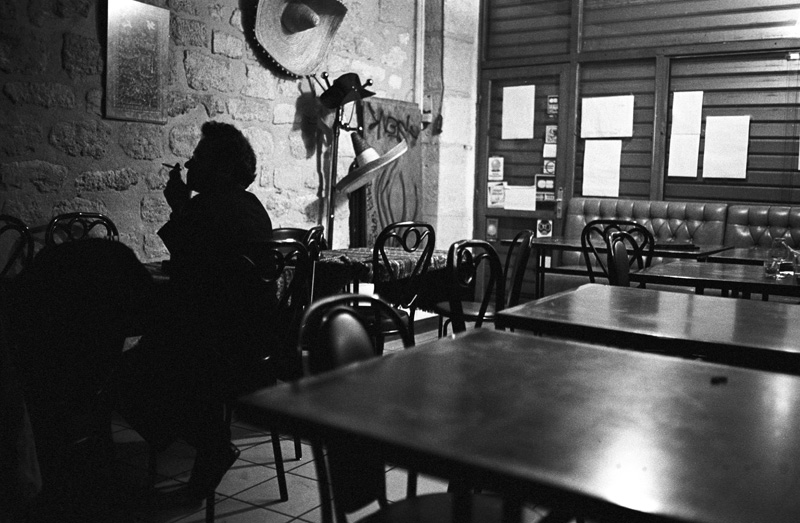
Where has everyone gone? Paris 2007 © Damaso Reyes
“In the battle for France, Jose Bové, the protester who vandalized a McDonald's in 1999 and was then running for president, proved to be no match for Le Big Mac. The first round of the presidential election was held on April 22, and Bové finished an embarrassing tenth, garnering barely 1 percent of the total vote. By then, McDonald's had eleven hundred restaurants in France, three hundred more than it had had when Bové gave new meaning to the term "drive-through." The company was pulling in over a million people per day in France, and annual turnover was growing at twice the rate it was in the United States. Arresting as those numbers were, there was an even more astonishing data point: By 2007, France had become the second-most profitable market in the world for McDonald's, surpassed only by the land that gave the world fast food. Against McDonald's, Bové had lost in a landslide.”
You can call it one of the unfortunate consequences of globalization. I would perhaps agree as a commentator but the fact of the matter is that those who make up the lines at the counter are overwhelmingly French. Have they forsaken their heritage? No. The richness of French culture is not so shallow that it can be threatened even by those famous golden arches. But are we headed towards a world of uniformity? Perhaps if we are not careful…
Wednesday, July 1, 2009, 11:22 - Personal, Commentary, Photo of the Day
The year is half over. The solstice was also a few days ago and now I have spent more time outside of Europe this year than inside it. The days are growing ever so slightly shorter and a return to Europe, like international communism during the Soviet era, is on the horizon but drawing no closer.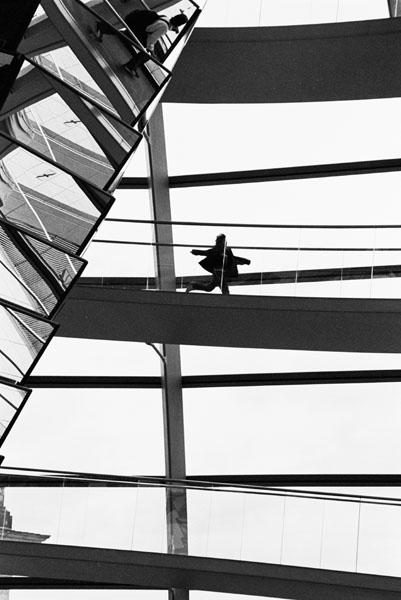
Freedom…. Berlin 2006 © Damaso Reyes
Even though it is at the heart of photography I have a distaste for waiting, especially when I don’t know how long I will be waiting. When will that next grant or fellowship appear? I have become comfortable with uncertainty and I suppose having everything mapped out would take a lot of the fun out of this project. We move forward but very slowly, which, if nothing else, gives us time to collect our thoughts. Certainly being back in New York has given me time to reflect on what I have done and how much more there is left to do.
I’d like to get started…
Friday, June 26, 2009, 10:17 - Commentary, Photo of the Day
How free are we? Can we say what we like? Can we publish our ideas without fear of legal punishment? Who decides what is allowable and what should be banned? These questions were of such concern to the framers of the American constitution that the first amendment to that constitution enshrined the freedom of speech. But most countries in Europe have no such legal assurances and as we have noted many times this allows ideas, books and groups to be banned, something which should concern us all. But those who understand the need for press freedom are fighting back after a fashion as we learn from the E.U. Observer.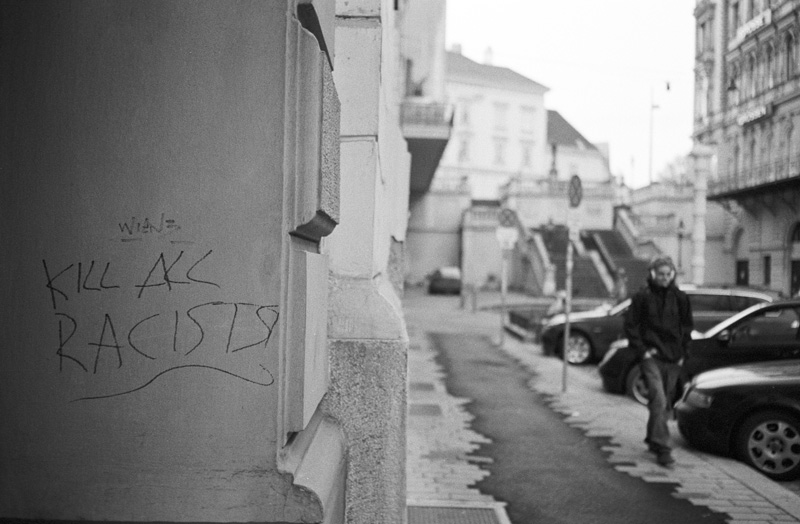
Free to offend. Vienna 2008 © Damaso Reyes
“In an effort to counter increasing worries about infringement of press freedom by governments in Europe, both within the EU and beyond, the editor-in-chief of Germany's weekly Stern magazine, together with EU media commissioner Viviane Reding on Tuesday (9 June) celebrated the launch of the European Charter on Freedom of the Press.
“Speaking to journalists in Brussels, Ms. Reding expressed her concern about threats to media freedom in "the east" but was reluctant to acknowledge similar worries emanating from Italy.”
The E.U. as well as individual European nations need to go much further in protecting the freedom of expression. It’s just that simple. But this is an encouraging sign that some semblance of balance is being restored…
Wednesday, June 24, 2009, 15:07 - Commentary, Photo of the Day
Hungary is an interesting example of the transformation that many Eastern European nations have gone through. One of those changes is a lively multi-party democracy. But interestingly enough it is the far right that has been perhaps the most savvy in using these new freedoms to their advantage as we learn from the Economist.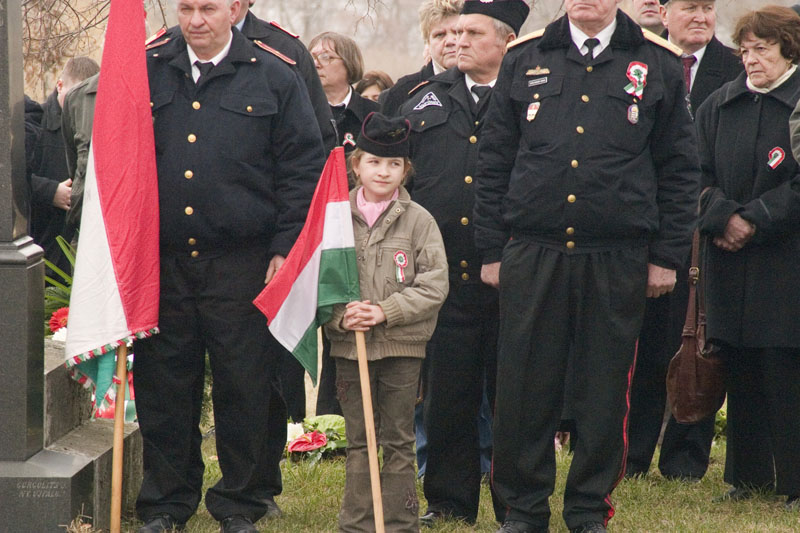
The next generation. Hungary 2009. © Damaso Reyes
“VIKTOR ORBAN, leader of Hungary’s centre-right Fidesz party, should be celebrating. His party has just won 14 of Hungary’s 22 seats in the European Parliament. The ruling Socialists, stricken by scandal and economic crisis, took only four. But Mr Orban is worried. For the other big winner was the far-right Jobbik party, with 427,000 votes and three seats. Supported both by far-right voters and by disgruntled ex-socialists, Jobbik is the big new thing in Hungarian politics.
“The party did best in the country’s rundown, often jobless eastern regions, where it played on growing fears of crime, which it linked to the Roma (Gypsy) minority. Jobbik denies anti-Roma racism; it says it is just against gypsy criminals. But the badges, black trousers and heavy boots of its uniformed wing, the Magyar Garda (Hungarian Guard), which marches in formation against Roma wrongdoers, evoke unhappy memories of Hungary’s past.”
The rise of the far right and of xenophobia in general through Europe should be cause for concern. Anytime a party or group uses fear as its main selling point bad things tend to happen. Far from helping to unite Europe, these groups are using xenophobia and economic fear to drive a wedge between Europeans. It’s nothing we haven’t seen before but in this day and age, that such arguments should still be widely credited at least with a large percentage of the electorate, is deeply disturbing.
Wednesday, June 24, 2009, 11:07 - Commentary, Photo of the Day
Hungary is an interesting example of the transformation that many Eastern European nations have gone through. One of those changes is a lively multi-party democracy. But interestingly enough it is the far right that has been perhaps the most savvy in using these new freedoms to their advantage as we learn from the Economist.
The next generation. Hungary 2009. © Damaso Reyes
“VIKTOR ORBAN, leader of Hungary’s centre-right Fidesz party, should be celebrating. His party has just won 14 of Hungary’s 22 seats in the European Parliament. The ruling Socialists, stricken by scandal and economic crisis, took only four. But Mr Orban is worried. For the other big winner was the far-right Jobbik party, with 427,000 votes and three seats. Supported both by far-right voters and by disgruntled ex-socialists, Jobbik is the big new thing in Hungarian politics.
“The party did best in the country’s rundown, often jobless eastern regions, where it played on growing fears of crime, which it linked to the Roma (Gypsy) minority. Jobbik denies anti-Roma racism; it says it is just against gypsy criminals. But the badges, black trousers and heavy boots of its uniformed wing, the Magyar Garda (Hungarian Guard), which marches in formation against Roma wrongdoers, evoke unhappy memories of Hungary’s past.”
The rise of the far right and of xenophobia in general through Europe should be cause for concern. Anytime a party or group uses fear as its main selling point bad things tend to happen. Far from helping to unite Europe, these groups are using xenophobia and economic fear to drive a wedge between Europeans. It’s nothing we haven’t seen before but in this day and age, that such arguments should still be widely credited at least with a large percentage of the electorate, is deeply disturbing.
Monday, June 22, 2009, 12:53 - Commentary, Photo of the Day
In the twenty years since the fall of the Berlin Wall a lot has changed in Germany. But a lot has stayed the same as we learn from the New York Times.
And the walls came tumbling down… Berlin 2006 © Damaso Reyes
“But outside big cities like Dresden, Leipzig or Berlin, in places like this former industrial mining town, the story of decline and departure has changed little in the former East Germany.
“Not far beyond the few thriving urban centers, traffic is often spare on the freshly paved highways, and at night in parts of Mecklenburg-West Pomerania in the northern part of the country, there is hardly a light to be seen to either side of the autobahns.”
Germany has spent billions upon billions to help reintegrate the East. Indeed in some ways it has been very successful with the chancellor even being an East German. But in many other ways the East feels forgotten and economically it is still recovering. The higher unemployment among other things has helped provide fertile ground for right –wing extremists. Germany must continue to do as much as it can to bring the East up to its own standards of living.
Friday, June 19, 2009, 11:31 - Commentary, Photo of the Day
Sometimes a crisis brings people together; more often than not it drives people apart. The global economic crisis™ has served the latter purpose for politicians across Europe as each seemingly seeks his or her own solution to a problem that doesn’t stop at the borderline. More from the New York Times.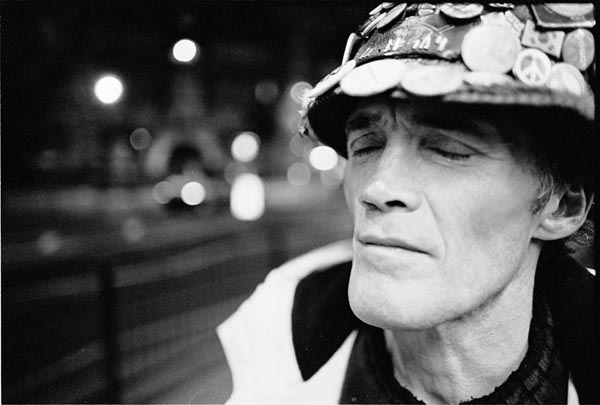
Brother can you spare a solution? London 2005. Damaso Reyes
“The crisis has presented the European Union with its greatest challenge, but even many committed Europeanists believe that the alliance is failing the test. European leaders, their focus on domestic politics, disagree sharply about what to do to combat the slump. They have feuded over how much to stimulate the economy. They argue about whether the European Central Bank should worry more about the deep recession or future inflation. And they have rushed to protect jobs in their home markets at the expense of those in other member countries.
“The latest European parliamentary elections on Sunday drove home the point. Only 43 percent of Europeans voted — a record low turnout, despite the financial crisis and compulsory voting in some countries. Far-right parties, opposed to the European Union and to immigrants from poor member countries, recorded gains, as did the Greens. Those who did vote weighed in largely on national issues.”
This is a perfect opportunity for Europe to come together to solve a common problem. But it seems like national leaders, and nationalistic activists, are more than happy to divide and conquer. The most likely result is a deepening of the crisis. Imagine if there was no effective U.S. national government and each state tried a different solution to this crisis? Nations like Germany of France may have the economic muscle to survive the chaos but what about Greece or Portugal? I think their need to be European solutions to European problems…
Thursday, June 18, 2009, 11:34 - Commentary, Photo of the Day
The results are in and the big winners in the recent E.U. parliamentary elections, besides Sweden’s Pirate Party of course, is the right, as we learn from Der Spiegel.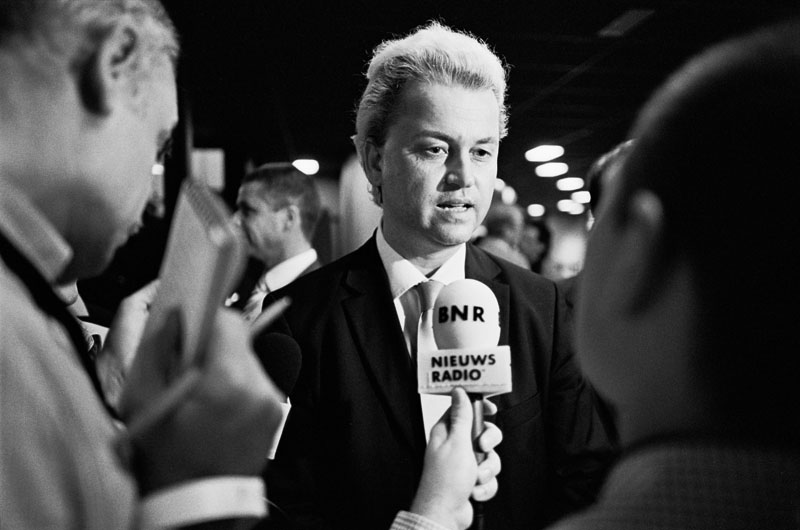
Thank you very much! The Hague 2005. © Damaso Reyes
“Geert Wilders and his populist Party for Freedom (PVV) appeared to be the big winners of Thursday's elections for European Parliament in the Netherlands. Exit polls released soon after the Dutch voting stations closed at 9 p.m. on Thursday evening predicted he would get four of the 25 Dutch seats in the European Parliament, making the PVV the second largest of all Dutch parties in Brussels.
“Wilders, who has become popular in the Netherlands running on an anti-Islam and anti-political establishment platform, promised voters he would be tough on immigration and criticized Turkey's bid to join the EU. "Should Turkey as an Islamic country be able to join the European Union? We are the only party in Holland that says, it is an Islamic country, so no, not in 10 years, not in a million years," Wilders said.”
Once again the right, and the Euroskeptics, have done a great job of organizing and getting their message out. The left, with a few notable exceptions like the Greens, are largely seeded the argument about what they like a united Europe should look like. Given the state of the economy there is no good reason the right should be winning elections but Europe likes to do things differently. Of course at the same time participation for this election was just 45%, showing that Europeans as a whole don’t really care either. The European Union really must work much harder to make itself feel relevant to the people it is supposed to be representing and serving…
Tuesday, June 16, 2009, 10:56 - Commentary, Photo of the Day
The people of Europe spoke, and the regulators listened!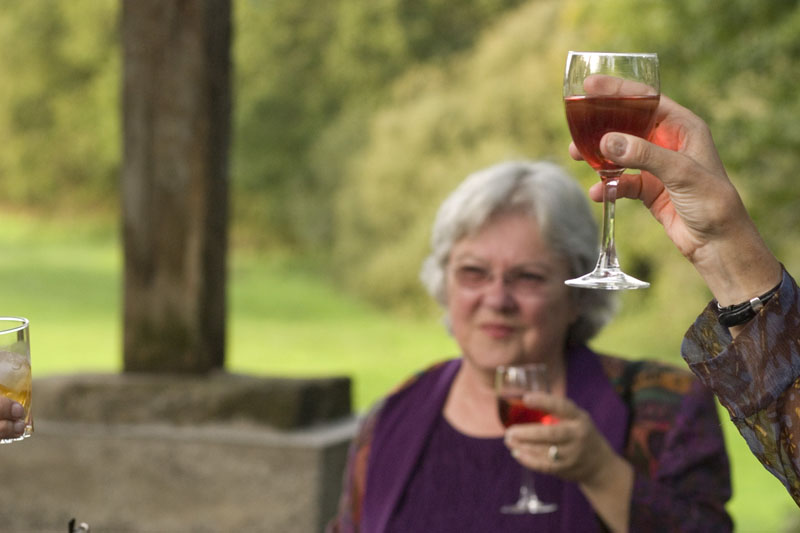
Cheers! France 2008. © Damaso Reyes
“The European Union, bowing to an outcry from traditional vintners, has reversed itself and decreed that the cut-rate technique of mixing red wine with white does not make an authentic rosé and thus cannot be used by Europe's winemakers.
“The decision, announced Monday at the union's headquarters in Brussels, represented a victory for French winemakers who had risen up against plans by the E.U. agriculture commission to end its ban on mixing as a way to compete with down-market rosés concocted by producers in such countries as Australia and South Africa. More broadly, it was a rare retreat by the forces of globalization and profit margins in the face of resistance from traditional artisans.
"It's important that we listen to our producers when they are concerned about changes to the regulations," the union's agriculture commissioner, Mariann Fischer Boel, said in a communique. "It's become clear over recent weeks that a majority in our wine sector believe that ending the ban on blending could undermine the image of traditional rosé.”
I think it’s great that the Eurocrats are starting to pay more attention to how their regulations actually impact the lives of people. Even better is the fact that the people who are being impacted spoke up, lobbied and won! Not only must government be accountable to the people to have a functioning democracy the people must feel as though government is accountable to them. In a small way this battle is a victory for those who have felt as though their voices did not matter. Let’s hope that it is the start of a trend…
Friday, June 12, 2009, 19:00 - Commentary, Photo of the Day
And just how are things going in Europe? Well our friends at Der Spiegel have traveled across the E.U. to answer just that question and here are the results! I am sure you will enjoy spending your weekend learning just what they found…The tie that binds… © Damaso Reyes
Wednesday, June 10, 2009, 18:47 - Commentary, Photo of the Day
As you know the current economic crisis has been tough on immigrants of all stripes. We learn of another group which has been hard hit in a great article from The New York Times.
Leave? But I just got here! Geneva 2007 © Damaso Reyes
“Trieu Dinh Van’s long journey two years ago from the rice paddies of northern Vietnam to a truck-welding factory in the Czech Republic was supposed to open up an economic lifeline. His parents, poor farmers, bet everything on him, putting up the family farm as collateral for a loan of about $14,000 to pay an agent for his plane ticket and working visa.
“Instead, Mr. Van, 25, is jobless, homeless and heavily indebted in a faraway land, set adrift by a global economic crisis that swallowed his $11-an-hour job and those of thousands among the wave of 20,000 Vietnamese workers who came here in 2007.
“The Vietnamese workers are part of a larger influx of poor Asian workers, including tens of thousands from China, Mongolia and elsewhere, who were recruited to come to Eastern Europe to become low-skilled foot soldiers in then booming economies. Now, they have been hit particularly hard by the sudden contraction of those economies.”
It’s not just what these migrants send home that’s important; it’s the money they spend when they are living their day to day lives. It’s also important to realize that just because they are leaving doesn’t mean there will be more jobs available for the native population since these immigrants were doing jobs that no one else wanted to do in the first place. When these economies pick up they may find themselves in a worse off position since immigrants will naturally be more reticent to travel so far and invest so much after what is happening right now…
Tuesday, June 9, 2009, 10:44 - Commentary, Photo of the Day
Far from containing the pirate problem, they are actually winning seats in the European Parliament!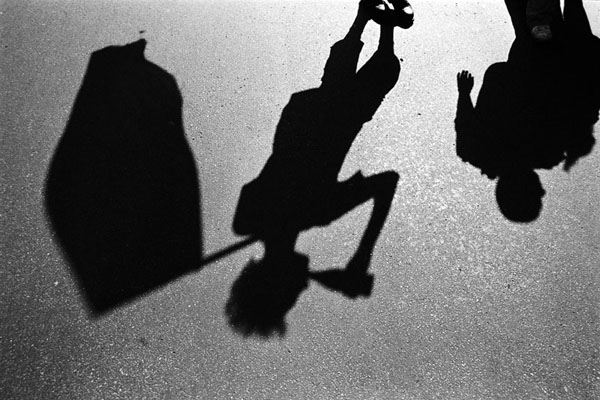
Hide your women and wine… Berlin 2007 © Damaso Reyes
“Sweden's pro-file sharing Pirate Party is on its way to Brussels having secured more than 7 percent of the country's votes in the European Parliament elections, according to early exit polls.
“Scenes of wild jubilation broke out at the party's election headquarters when state broadcaster SVT announced a projection likely to give the party enough votes to claim two seats in the EU parliament.”
Personally I think it is great. I real, live political movement has begun and even more exciting is the fact that it has caused young people to become more engaged in European politics, can you ask for a better outcome. I can only hope that these new M.P.s take their responsibilities seriously and strongly advocate for their constituents…
Friday, June 5, 2009, 10:59 - Commentary, Photo of the Day
The global economic crisis ™ has had all kinds of interesting effects, some of which we won’t learn about for many years. Of course there are others which are much more immediate and the money that once fueled our mobility is increasingly drying up, as we learn from the I.H.T.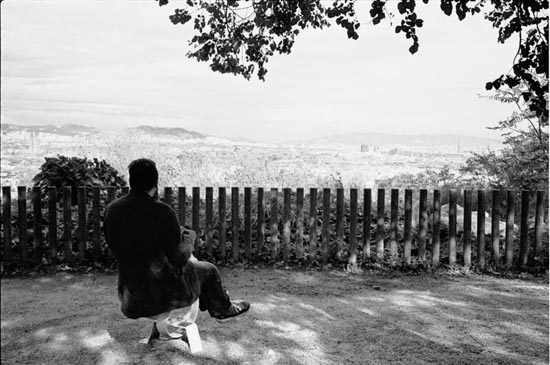
But I don’t want it to end! Barcelona 2005. © Damaso Reyes
“A stumbling British economy is doing what the French have not been able to do in 200 years: rout the British.
“For more than a decade, Englishmen have been one of Britain’s biggest cross-channel exports: they bought second homes in French villages, or even retired there. They came to make up as much as one-fifth of the population in some French villages.
“But now the flow of Britons is slowing and, in some cases, reversing course.
“Only instead of bidding them a relieved adieu, many of the French are longing for them — and their money — to stay.”
Europeans take their mobility for granted and it has created lots of interesting communities. But as a result of this downturn we are seeing a lot of people, both rich and poor, going home. All that easy money and cheap labor is now not so abundant. In the case of some of these small French villages the economic lifeline that kept them alive now may be gone and who knows when, or if they will return. I cringe at the thought of all that wine going undrunk…
Wednesday, June 3, 2009, 10:43 - Commentary, Photo of the Day
It’s election time! At least in Europe where millions of Europeans will soon go to the polls for European Parliamentary elections. But there are big concerns over turnout, as we learn from Der Spiegel.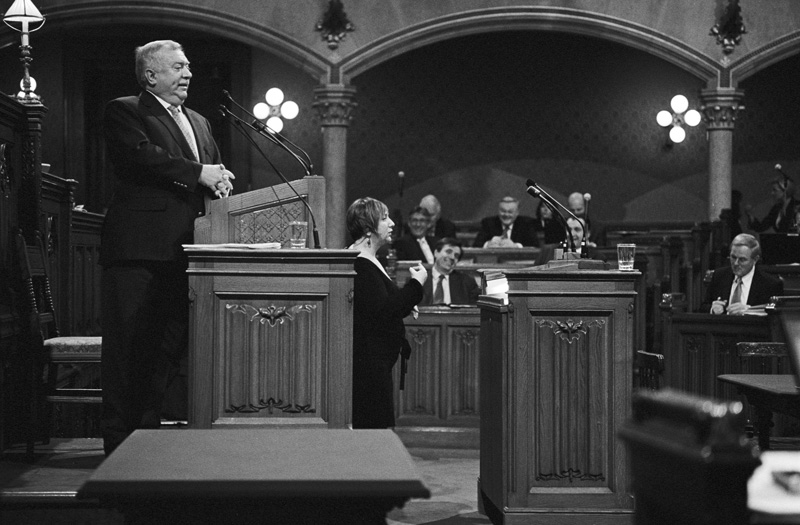
“What do you mean ‘throw the bums out’ ?” Vienna 2008. © Damaso Reyes
“With polls predicting a record low turnout for the elections to the European Parliament later this week, the leaders of France and Germany have issued a joint plea urging voters to cast their ballots.
“German Chancellor Angela Merkel and French President Nicolas Sarkozy called for a "strong Europe" in a statement published simultaneously in the Sunday newspapers, the Journal du Dimanche in France and Die Welt am Sonntag in Germany and they urged all Europeans to vote in the elections to be held from June 4-7.
“A strong Europe does not necessarily mean more powers for the European Union, even more European legislation or increased financial demands," Sarkozy and Merkel wrote.
"We don't want a bureaucratic Europe." Instead the two called for an EU "that gives brave answers to the questions of our time, in order to secure our prosperity."
What’s interesting is that while these two leaders are calling for a stronger Europe neither has given any indication that they are willing to give up any of their own power to achieve this ideal. Europeans are wary of pan-European institutions for good reason. So far, they have seen very little benefit and much more of the “bureaucratic Europe” that is talked about in the article. If European leaders want to develop a European consciousness then they need to be much more active about the process and not just give speeches around election time…
Back Next

 Calendar
Calendar




